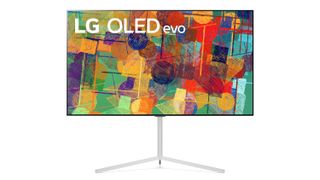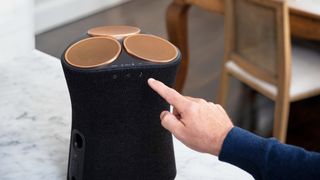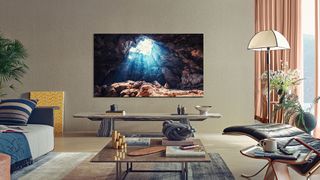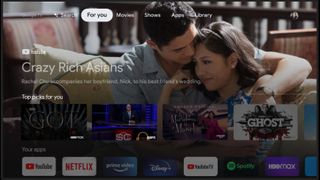We've had Sony's Airpeak drone, Samsung's butler robot for your washing-up needs, tuneable glasses that let you adjust lens strength, and pretty much a health-checking app for everything. Indeed, while CES 2021 has been a markedly different affair due to its online-only format, the consumer electronics show has kept up its tradition of being a stage on which the latest, greatest and craziest technological innovations are introduced.
But while it's a soapbox for future, far-out concepts, it's also a reliable launchpad for the next-generation technology coming to our homes. As has become par for the course, TVs have hogged most of the CES 2021 spotlight, with LG, Samsung, Sony, Panasonic and TCL all revealing brand new TV technologies and models.
No CES is complete without a slew of new audio products, though, and doing two-channel proud has been the likes of JBL and Sony – even if high-end hi-fi remains something of a distant memory for the Vegas trade show.
The first-ever virtual CES may have been a frustratingly hands-off affair, but we can't complain about the quality of new products that have been revealed. From rollable phones and TVs, to wireless earbuds and next-gen OLED panels, here's our round-up of the most exciting consumer electronics products and technologies; the best of CES 2021.
LG 'OLED evo' TV panel

LG is sticking to its OLED guns for (at least) another year, but the arguably necessary shake-up comes in the form of a brand-new OLED panel it's calling 'evo'. The OLED overlord says it brings such advancements that it represents the 'Second Evolution' of OLED (with the first having been the move to 4K HDR in 2015), and is no doubt the company's response to critics who say OLED panel technology has reached its technical limitations.
By featuring a new luminous element to the panel structure, evo supposedly produces brighter, punchier and more detailed images than the OLED panels LG has previously produced for itself and other TV brands. While the majority of LG's OLED TV line-ups in recent years have shared the same panel, this will, however, introduce more disparity in the 2021 LG OLED range – only the 4K G1 OLEDs (and presumably the higher-ranging 8K models) are set to get it, with the lower-ranging 4K A1, B1 and C1 series missing out.
Sony 360 Reality Audio expansion

Sony's expansion of its 360-degree spatial sound technology is two-fold: it's introducing two new 360 Reality Audio-supporting wireless speakers, and pairing the format with video streaming for the first time in an attempt to emulate an immersive live gig experience.
The Sony SRS-RA5000 (£500, €599) and SRS-RA3000 (£280, €359) are hi-res, wi-fi and Bluetooth speakers with omni-directional drivers that have not only been designed to make the most of the formatted tracks (which are currently available on Tidal and Amazon Music HD), but also to upscale stereo tracks, courtesy of Sony's Immersive Audio Enhancement technology.
During its CES 2021 press conference on Monday, Sony showcased its 360 Reality Audio and video pairing with a Zara Larsson concert clip – an experience that could, to some extent at least, fill the gaping hole in gig-going caused by the Covid-19 pandemic. Sony is currently in talks with music labels and service providers to begin launching streaming video content later this year, so watch this space.
LG Rollable phone
Roll up, roll up! Or, in the case of LG's new rollable phone, roll sideways, roll sideways. LG already makes rollable TVs, of course (and has a new one to show off, at that), but, perhaps unsurprisingly, it's now working on developing a rollable phone. We've known this since September, however CES 2021 has provided our first look at the concept handset in action.
During the firm's press conference, the LG Rollable was demoed expanding sideways to create a tablet-like device. As you can see in this clip and the one above, its screen smoothly expands into a larger one by rolling out from the opposite edge. Details are slim on the ground, but LG's message to the phone industry (and perhaps specifically its Korean rival, Samsung) was clear: the future is rollable, not foldable.
Samsung Neo QLED TV

The fact that Samsung is finally launching consumer-friendly versions of its MicroLED TVs this year is fantastic news... for the mega rich. Indeed, while the giant, modular displays the firm has dazzled eyes with for years are going to be offered in more living room-friendly packages and without quite the eye-watering price tags, they're still going to be prohibitively expensive for most of us. A more accessible Samsung offering? Its equally exciting, all-new Neo QLED TVs (pictured above and top).
These premium TVs essentially pair QLED (quantum dot) technology with Mini LED backlighting. Our Samsung 2021 TV lineup offers a detailed lowdown on the technology, but in short the Neo QLEDs use extremely tiny 'New LED' backlights that, instead of having protective packaging and light-guiding lenses like traditional LEDs, use a new 'micro layer' that guides the light through the quantum dots (which provide the set's colours).
The promise: no light leakage or blooming. Because the New LEDs' diminutive size means significantly more of them can be packed in, we can expect even better contrast control than last year's already impressive QLED TVs. Fingers crossed.
- Samsung 2021 TV lineup: everything you need to know
- Samsung announces 2021 'Neo QLED' TVs with Mini LED backlight tech
Sony Bravia CORE video streaming service

Sony has introduced its own movie streaming service, and while it's not going to be a replacement for Netflix, it could well set a new standard for streaming picture quality.
The Bravia CORE catalogue offers "hundreds of the latest releases and classic blockbuster movies" (including the "largest IMAX Enhanced collection"), available to stream in 4K HDR on compatible* Sony Bravia TVs in up to 80Mbps quality – that's almost four times the quality of Netflix's 4K HDR streams.
Of course, that means you'll need huge internet capabilities: a minimum internet speed of 115Mbps for 80Mbps quality (or 43Mbps for 30Mbps quality), according to Sony. If you've got the bandwidth you should have picture quality that more or less matches Ultra HD Blu-rays. That'd be a first for movie streaming.
*Sony lists eligible new TVs at the bottom of this page and also specifies how many free 'credits' (i.e. films) a TV purchase gets you.
JBL 75th anniversary hi-fi

Hi-fi launches at CES have been dwindling in recent years. This isn't hugely surprising considering, a) the increasing headline-stealing dominance of TVs, and b) the quality of the international Munich High End Show further in the calendar year. But there's often a gem or two to be found – last year they were the JBL L82 Classic and NAD Masters M33 – and this year's no different. JBL has kicked off its 75th anniversary on the front foot, using the world stage to introduce two new celebratory products.
The limited-edition JBL L100 Classic 75 floorstanders ($5500), of which there are only 750 pairs, are acoustically and aesthetically tweaked versions of the 2018-released (and well reviewed) L100 Classic, complete with special edition badges and commemorative plaques.
The second member in the inarguably classy combo is the JBL SA750 Class G streaming amplifier ($3000, pictured), which marries old with new by packaging streaming-savvy features into a retro casing made of milled aluminium and teak wood veneer.
- JBL kicks off 75th anniversary celebrations with L100 Classic speakers
- JBL SA750 is a modern-retro Class G amplifier with streaming
Google TV gaining momentum

Google's Android TV has been the smart platform for Sony and Philips sets in recent years but now the search giant has a new software platform: Google TV. Already inside the latest Google Chromecast stick, we're now seeing the first TVs that will run it.
At CES 2021, both Sony and TCL announced new models that embrace Google TV. Sony's 2021 Bravia XR TVs – the Master Series Z9J, A90J, A80J, X95J, X90J, X85J and X81J – all support it. TCL has been less forthcoming about specific models, simply stating it plans to roll out a series of Google TV-toting sets in the US first, before expanding to other regions later in the year.
Google TV offers over 6500 apps and supports more than 30 streaming services. It's slick, highly usable and has one of the best recommendation engines we've ever tested, so it should make for an excellent addition to forthcoming TVs.
More Technics true wireless earbuds

At CES 2020, Technics announced it was joining the true wireless earbuds revolution with the EAH-AZ70W, which proved themselves fine performers. Twelve months later and we have a promise (albeit very little else) of the firm's next pair, due "later this year".
We don't know whether this new model will be a successor to, or a sibling of, the EAH-AZ70W, but there was a hint that they could be cheaper: “Now, for the first time, that legendary audio experience is available to everyone,” announced the speaker during the Panasonic press conference.
Noise-cancelling was also mentioned, so hopefully we'll have a nicely priced pair around the £150 ($150) mark to rival the Sony WF-1000XM3 and AirPods Pro and help stamp the brand's authority on the market.
OLED TV is going smaller (again)

Just a few years ago, OLED TVs were limited to 55 inch and 65 inch sizes. Fast forward to 2021 and we have a choice of seven screen sizes. That's in part due to the rising popularity of much bigger screens, especially in the US, but also recently due to the availability of smaller OLED screens too.
Last year, LG introduced the 48 inch size – the Sony KD-48A9 (which used LG's 48in OLED panel) was our TV of the year, no less, and LG's own OLED48CX (pictured above) also proved impressive, demonstrating that the panel technology could flourish in smaller screens too.
And 2021 could be the year we see a 42-inch OLED TV on shop shelves. LG Display has shared key specs on the displays it’ll be offering to TV manufacturers this year, and they include a 42-inch option. However, no TV brand has yet announced plans for a 42-inch model – so it's one for the future.
Whenever it arrives, one thing looks certain: OLED isn't done yet and will undoubtedly hit more homes, and maybe even more rooms in homes, if sizes and prices continue southwards.

